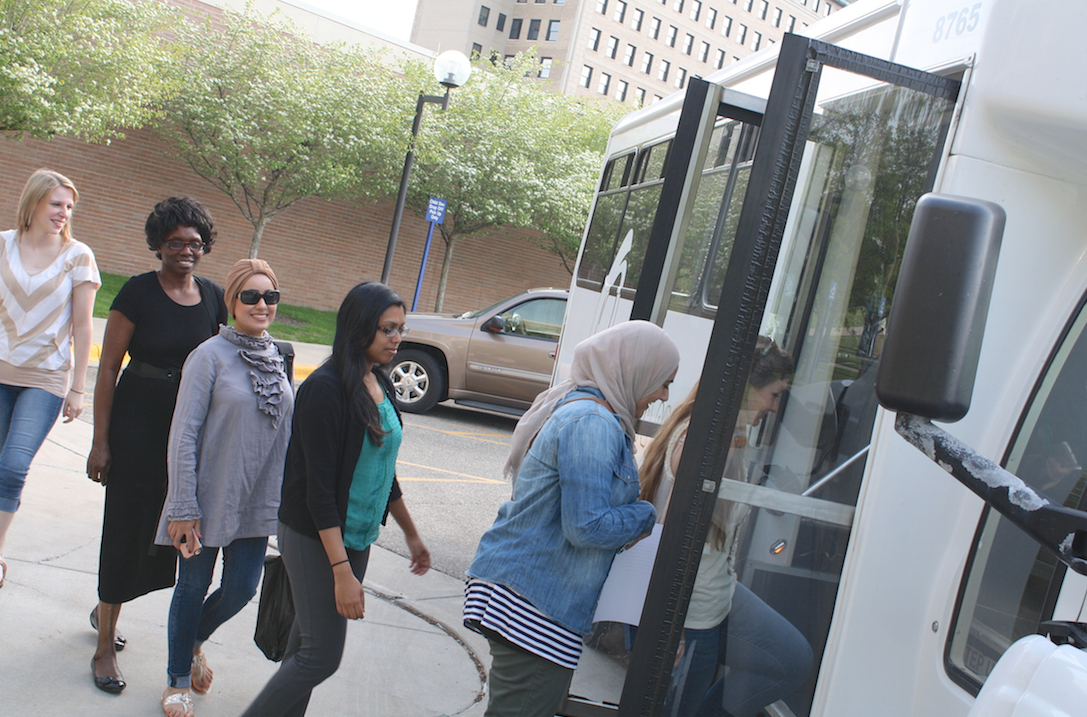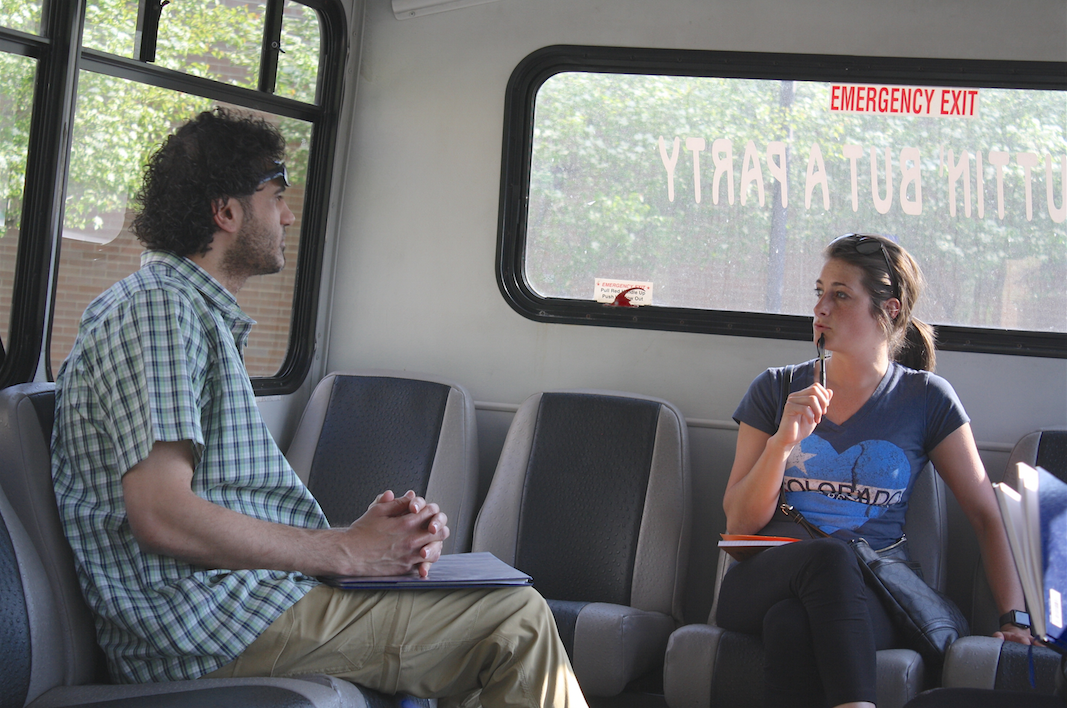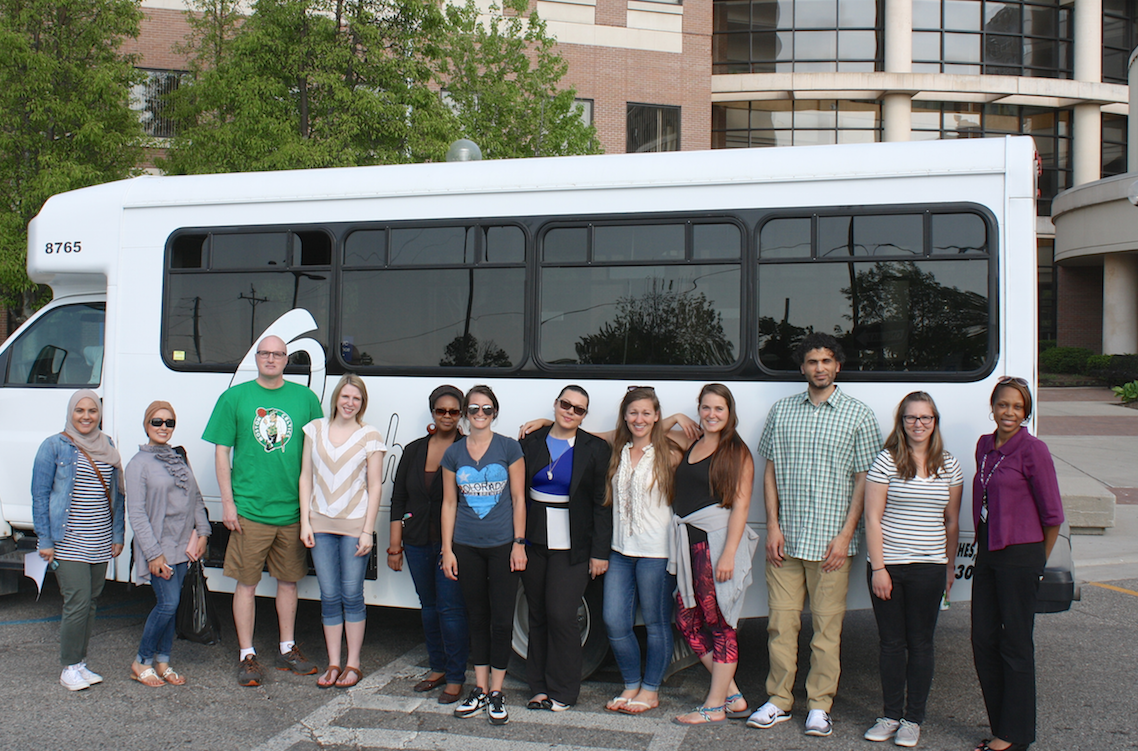This past month, a dozen of our PHHS Health Education students participated in a Windshield Tour of Flint as part of their HED 543 Community Assessment class, lead by lecturer Shannon Brownlee, MPH. Conducted through the Genesee County Health Department REACH program, the Windshield Tour offers individuals a chance to gain an understanding and awareness towards the social and environmental issues that occur in Flint.
PHHS was fortunate enough to capture feedback from a few of our students who shared their tour experiences with us below!
I wanted to say that during the windshield tour it was evident at least in the situation of Flint that the residents in Impoverished communities even when united might find it hard to combat systemic inequalities in their communities without outside help (as seen with the Flint Water Crisis). I believe that in order for the residents of Flint to counter the debilitating effects of their present condition, residents should continue to advocate for one another through community organizing and building.
In order to keep political attention on the systemic wrongs which have crippled the remaining population, community leaders can also play to the general attributes of the city such as its union founding history, remaining manufacturing production, college town prestige, and the solidarity of the people. –Jessica Gutierrez
The Windshield Tour gave me some great insight into Flint’s environment. We had the opportunity to see both the good and bad aspects of the city. Some of the bad that really stood out to me was the number of liquor stores that were accessible across town and the huge lack of quality grocery stores. On the other hand, it’s great seeing universities and hospitals trying to rejuvenate the city, both through public health and economic efforts. In the end, although Flint is not the city that’s portrayed in the news, it is certainly a place that greatly needs public health initiatives. -Deepika Kandasamy

One of the more common themes explored was the difficulties the community faces as far as access to health options such as grocery stores, or even in finding health information itself. The students were better able to understand these barriers and the work being done to help bridge these shortcomings.
It was an eye opener, I was able to see both the good and bad parts of Flint communities. Regarding health message, if feel it is hard to reach out or to educate community members about health options. I noticed that areas with predominant minorities have many grocery stores. This limits community members to access fresh vegetables and fruits. I feel that health policies should be re-evaluated to improve the health conditions of disadvantaged communities. -Lumba Moonga
From a community organizing standpoint, participating in the Windshield Tour was very important. It allowed us to better understand the barriers that the community members face. Often times, public health professionals believe that their ideas/interventions are the most important thing for the community. The issue with this notion is that the community members may not perceive these ideas to be important and thus they will not comply. Utilizing several techniques including a Windshield Tour will better equip us with a feel for the community that we are assisting. Community organizing is all about getting people on the same page. In order to reduce the disconnect between the public and the health professionals, a thorough community assessment must be conducted.
This Windshield tour helped me tremendously in regards to my personal assessment of the community. I learned a great deal of information about Flint’s history as well as the current issues that the city faces. I have gained a newfound respect for the community and now understand the many struggles that people face in Flint. We have been socialized to believe that everyone is responsible for the position that they are in which is not accurate at all. In the future, it will be important for me to be less judgmental and more culturally competent in order to better assist this city! -Joseph Alnarshi
The windshield tour was extremely beneficial for assessing a community. I found it extremely beneficial as I am not a Flint native and new to the East side of Michigan. The windshield tour allowed me to see first hand what truly is going on in the city of Flint rather than hearing second hand information through the news or other sources. Within the public health field and classes, conversations are constantly based around Flint therefore it was extremely beneficial to physically see what has been discussed in previous classes. I was able to see how the city is laid out with different areas which were flourishing and other areas which are experiencing tougher times and oppression.
The tour gave me a new, unique perspective while being able to physically see the areas within a community which need assessing to decrease the barriers experienced by its citizens. Through seeing the city through a guided tour, I now have a much better understanding to the barriers and assets of the community and how these play into the health disparities experienced by the Flint community.
A windshield tour is an excellent and cutting edge way to assess a community and its needs allowing decision holders truly a boots on the ground point of view. Actually driving the streets, walking through the stores, and seeing the different socioeconomic areas of the city, allows for a better, more complete and encompassing assessment therefore improving the overall public health of a community with comprehensive, optimal, and sustainable policies to empower communities. –Jennifer Wisniewski

Many students were able to gain insights into Flint itself, as not everyone on the tour resides in the area. With Flint’s decline after many years as a strong community, it is important to recognize the growth and the beginnings of a return. Many of the students on the tour were able to notice these positive changes.
As a student who commutes from Macomb Township, I did not really know much about the city of Flint, prior to starting graduate school at the University of Michigan-Flint. I knew the city was once a great area to find work, especially within the General Motors Company. This tour provided me with much insight towards the everyday living conditions of community members. Flint is currently faced with limited access to healthy foods, lack of space for outdoor exercise, and in some areas there are high levels of crime. All too often we hear about all of the negative things a community has to offer. I was glad we were able to see some of the up and coming things occurring in Flint, like the Chevy Commons parks, and the test track installation at Kettering University. –Ashley Page
I consider Flint, Michigan a diamond in the rough. It has hidden unique characteristics and holds future potential that make it an extraordinary city. The windshield tour was an eye opening experience. It gave us a first class experience to witnessing everything that makes this community what it is today. We were able to see the good, the bad, the ugly, and more importantly the future of Flint. Although the city is far different from what it was back in 1980’s, flash forward to 2016 and the streets are filled with young students, professionals, and residents all making a way for themselves. It’s a new fresh Flint. A Flint that was able to pick its self back up from times of deindustrialization, poverty, high crime rates, to a new bustling successful and prosperous city. Even through the setbacks, Flint continues to persevere and shine bright like the diamond it is. -Maha Khrais
The Health Education 543 Community Assessment course provides a broad understanding of the concepts involved in the process of community organization, including assessing the socio-political structure of communities, developing strategies for change within a community, and the role of the health educator in this process. Topics of the course include: definition of a community, a review of social factors that impact disease, community assessment methods, models of community organization, and strategies of community organizing.
The Public Health and Health Sciences Department is “Public Health in the Community” and looks forward to more opportunities to help educate and make an impact in the Flint area. For more information on the Department of Public Health and Health Sciences and programs offered, please visit our website here!

